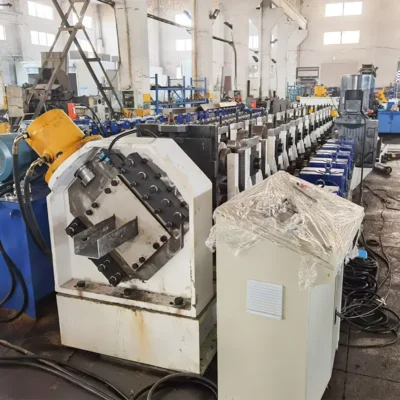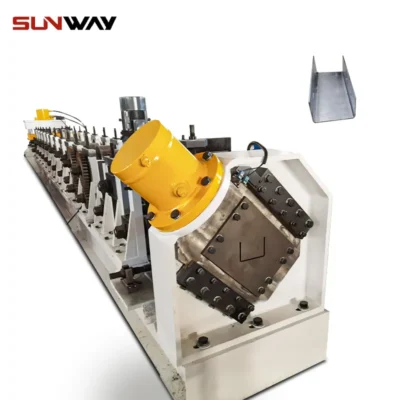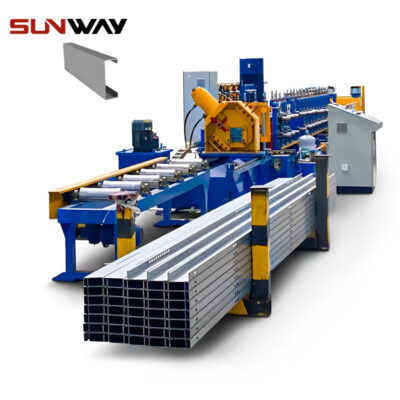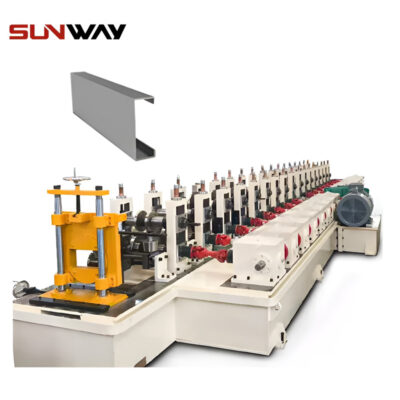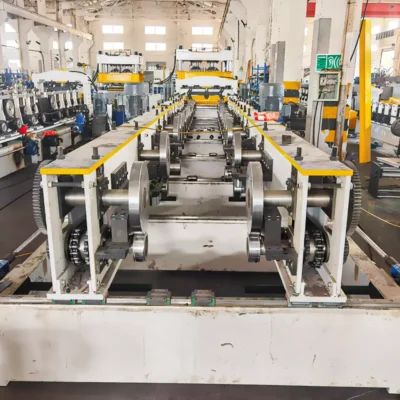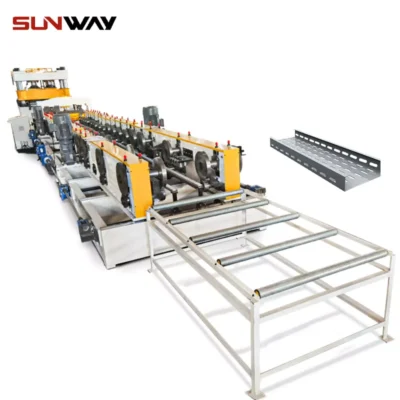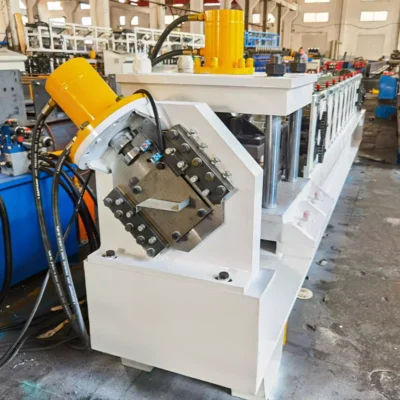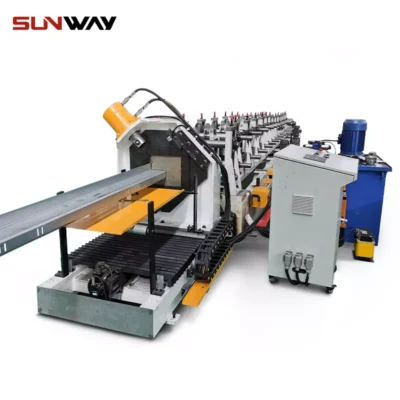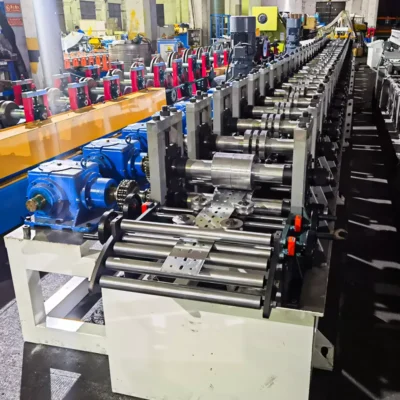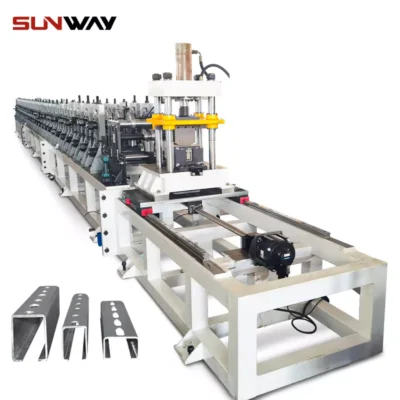In a world increasingly focused on sustainability and environmental conservation, recycling has become a cornerstone of responsible manufacturing. Recycling plants play a critical role in this process by repurposing waste materials into usable products. However, the infrastructure and components that power these plants require advanced, durable, and precisely engineered materials. Enter the Recycling Plant Roll Forming Machines, an innovation designed to produce high-quality structural profiles and components that enable recycling facilities to operate efficiently.
From conveyor systems to support structures and metal enclosures, roll-forming machines are revolutionizing the way recycling plants are constructed and managed. By automating the production of essential components, these machines empower manufacturers to meet the growing demand for sustainable recycling solutions.
In this guide, we’ll explore the applications, benefits, features, pricing, market trends, and future potential of Recycling Plant Roll Forming Machines. Additionally, we’ll highlight why Wuxi Sunway Machinery is a trusted name in delivering cutting-edge roll-forming solutions for the recycling industry.
What is a Recycling Plant Roll Forming Machine?
A Recycling Plant Roll Forming Machine is an industrial system designed to produce metal profiles and structural components for recycling facilities. These components include conveyor frames, support beams, metal panels, and enclosures used in material sorting, processing, and storage systems.
The machine shapes raw metal coils—typically galvanized steel, stainless steel, or aluminum—into precise profiles through a series of rollers. The resulting products are durable, lightweight, and designed to meet the specific requirements of recycling plants, ensuring efficiency and long-term reliability.
Applications of Recycling Plant Roll Forming Machines
Recycling Plant Roll Forming Machines are versatile tools that can produce a wide range of components for various applications within recycling facilities. Let’s explore their key applications:
1. Conveyor Systems
- Use Case: Profiles for frames, tracks, and supports in conveyor systems used to transport recyclable materials.
- Why It Matters: Ensures smooth, durable, and efficient material handling, even under heavy loads.
2. Material Sorting Infrastructure
- Use Case: Structural beams and panels for sorting stations where materials like plastic, metal, and paper are separated.
- Why It’s Crucial: Provides a stable and organized framework for high-speed, automated sorting systems.
3. Storage Bins and Enclosures
- Use Case: Metal profiles for walls, doors, and compartments of storage bins and equipment enclosures.
- Why It’s Important: Protects materials and equipment from external elements, ensuring operational efficiency.
4. Processing Machines
- Use Case: Frames and housings for shredders, compactors, and other recycling equipment.
- Why It’s Relevant: Enhances the durability and reliability of machines that process materials under high pressure and stress.
5. Green Building Construction
- Use Case: Profiles for constructing recycling plant buildings, including roofs, walls, and structural supports.
- Why It’s Exciting: Enables the creation of eco-friendly facilities with sustainable materials.
6. Modular Recycling Units
- Use Case: Lightweight profiles for portable or modular recycling units used in remote or temporary locations.
- Why It’s Critical: Facilitates flexible and rapid deployment of recycling infrastructure where needed.
Key Features of Wuxi Sunway Recycling Plant Roll Forming Machines
Wuxi Sunway Machinery is a recognized leader in roll-forming technology, offering machines specifically designed for the recycling industry. Here are the standout features of their Recycling Plant Roll Forming Machines:
1. High-Strength Material Processing
- Supported Materials:
- Galvanized steel
- Stainless steel
- Aluminum alloys
- Why It Matters: Ensures the production of components that can withstand the heavy loads and demanding conditions of recycling plants.
2. Multi-Profile Capability
- What It Supports: Machines can produce a variety of profiles, including channels, beams, and panels.
- Why It’s Beneficial: Allows manufacturers to cater to diverse needs within recycling facility construction and operation.
3. Customizable Design
- What It Offers: Machines can be configured to produce custom profiles tailored to specific recycling plant requirements.
- Why It’s Important: Provides flexibility for manufacturers to meet unique project specifications.
4. Integrated Punching and Cutting
- What It Delivers: Built-in systems for punching holes, creating slots, and cutting profiles to length.
- Why It’s Revolutionary:
- Reduces the need for secondary processing.
- Speeds up production timelines.
- Ensures precision for easy assembly.
5. High-Speed Production
- Performance: Capable of producing up to 25–30 meters of profiles per minute, depending on the material and design.
- Why It’s Relevant: Meets the high-volume demands of large recycling facility projects.
6. IoT and Automation Integration
- What It Provides: Real-time monitoring, data collection, and automated adjustments through IoT-enabled sensors.
- Why It’s Critical:
- Enhances production efficiency and minimizes errors.
- Enables predictive maintenance to avoid downtime.
- Supports Industry 4.0 initiatives for smart manufacturing.
7. Energy-Efficient Design
- What It Includes: Energy-saving motors and optimized power consumption systems.
- Why It Matters: Reduces operational costs and aligns with sustainability goals in manufacturing.

Production Workflow of a Recycling Plant Roll Forming Machine
The production process for recycling plant components is designed to be efficient, precise, and scalable. Here’s an overview of the workflow:
1. Material Loading
- Raw metal coils are loaded onto the machine’s decoiler, which feeds the material into the rollers.
2. Leveling
- A leveling system ensures the material is flat and defect-free before entering the roll-forming section.
3. Roll Forming
- The material passes through a series of rollers that shape it into the desired profile incrementally.
4. Punching and Cutting
- Integrated systems create holes, slots, or embossing patterns and cut the profiles to the required lengths.
5. Quality Inspection
- Each profile is inspected for dimensional accuracy and surface finish to ensure compliance with design specifications.
6. Stacking and Packaging
- Finished profiles are automatically stacked and prepared for transportation or assembly.
Pricing of Recycling Plant Roll Forming Machines
The cost of a Recycling Plant Roll Forming Machine depends on its features, production capacity, and customization options. Below is a general pricing guide for 2025:
| Machine Type | Capabilities | Price Range (USD) |
|---|---|---|
| Standard Machines | Basic profile production | $150,000–$250,000 |
| Advanced Machines | High-speed and multi-profile output | $250,000–$400,000 |
| Customizable Machines | Including punching, IoT, and automation | $400,000–$600,000 |
For detailed pricing and financing options, contact Wuxi Sunway Machinery.
Market Trends and Growth Opportunities in 2025
The demand for Recycling Plant Roll Forming Machines is driven by the global push toward sustainability and resource efficiency. Here’s what’s shaping the market:
1. Rising Demand for Recycling Infrastructure
- The Trend: Governments and private sectors are investing heavily in recycling plants to meet waste reduction goals.
- Impact on Machines:
- Increased demand for high-quality structural components.
- Roll-forming machines must deliver scalable solutions for large projects.
2. Circular Economy Initiatives
- The Goal: Transitioning to a circular economy where materials are reused and recycled.
- How Machines Help:
- Enable the production of recyclable components for recycling facilities.
- Support eco-friendly manufacturing practices.
3. Technological Advancements
- The Shift: Recycling plants are adopting advanced technologies like AI and IoT for efficient operations.
- Why It Matters:
- Roll-forming machines must integrate seamlessly with smart manufacturing ecosystems.
- IoT-enabled machines provide real-time insights for process optimization.
4. Global Sustainability Goals
- The Push: International agreements like the Paris Accord are driving investments in green infrastructure.
- How Machines Fit In:
- Support the construction of sustainable recycling facilities.
- Produce components that align with green building standards.
FAQs About Recycling Plant Roll Forming Machines
| Question | Answer |
|---|---|
| Can these machines handle custom designs? | Yes, they can produce profiles tailored to specific recycling plant requirements. |
| What materials can the machine process? | Supported materials include galvanized steel, stainless steel, and aluminum alloys. |
| Does Wuxi Sunway offer installation support? | Absolutely! Full installation, training, and after-sales support are provided. |
| What is the machine’s lifespan? | With proper maintenance, these machines can last 15–25 years or more. |
| How do these machines support sustainability? | They minimize waste, process recyclable materials, and operate with energy-efficient systems. |
| What industries use this machine? | Industries include recycling, waste management, and eco-friendly construction. |
Workflow Optimizations in Recycling Plant Roll Forming Machines
Efficiency is crucial when producing components for recycling plants, as these facilities often face tight deadlines and high demand. Modern Recycling Plant Roll Forming Machines incorporate advanced workflows to optimize production. Here’s how:
1. Automated Material Feeding
- How It Works: The machine is equipped with automated decoilers and feeders to handle raw metal coils.
- Why It’s Efficient:
- Eliminates manual loading errors.
- Ensures a continuous flow of material for uninterrupted production.
- Reduces operator dependency, enabling oversight of multiple machines simultaneously.
2. Precision Leveling and Straightening
- What It Does: A leveling system ensures the raw material is perfectly flat and free of defects before entering the roll-forming section.
- Benefits:
- Prevents issues like warping or distortion during forming.
- Guarantees consistent quality in the final profiles.
- Reduces post-production corrections, saving time.
3. Integrated Punching, Cutting, and Embossing
- The Feature: These machines come with built-in systems for punching holes, creating slots, and embossing patterns.
- Why It’s Revolutionary:
- Eliminates the need for separate machinery or manual operations.
- Ensures perfect alignment and precision in every cut.
- Reduces production timelines, allowing for faster project turnarounds.
4. High-Speed Roll Forming
- What It Achieves: Advanced servo motors and optimized roller systems enable high-speed production.
- Key Metrics: Capable of producing 25–30 meters of profiles per minute, depending on material and design complexity.
- Why It’s Critical:
- Meets the growing demand for recycling plant components.
- Helps manufacturers scale production without compromising quality.
5. Automated Stacking and Packaging
- What It Does: Finished profiles are automatically stacked and bundled for transportation or on-site assembly.
- Why It’s Beneficial:
- Simplifies logistics by organizing profiles into ready-to-ship packages.
- Protects components from damage during storage or transit.
- Reduces manual handling, improving overall workflow efficiency.
Environmental Contributions of Recycling Plant Roll Forming Machines
In the fight against climate change and resource depletion, Recycling Plant Roll Forming Machines contribute to environmental sustainability in several impactful ways:
1. Promoting a Circular Economy
- How It Helps: These machines produce components for recycling plants that process and repurpose waste materials like plastic, metal, and paper.
- Environmental Impact:
- Reduces landfill waste by enabling efficient material recovery.
- Supports industries in reusing materials, minimizing the extraction of virgin resources.
- Aligns with global sustainability goals, such as the UN’s Sustainable Development Goals (SDGs).
2. Efficient Resource Utilization
- The Advantage: High-precision rollers and cutting systems maximize material usage, reducing scrap and wastage.
- Why It’s Important:
- Conserves raw materials, lowering production costs.
- Prevents unnecessary waste generation during manufacturing processes.
3. Energy-Efficient Operations
- What It Includes: Energy-saving motors and optimized production settings reduce electricity consumption.
- Environmental Benefit:
- Lowers the carbon footprint of manufacturing operations.
- Aligns with green building certifications and energy efficiency standards.
4. Use of Recyclable Materials
- What It Enables: Machines are capable of processing materials like aluminum and steel, which can be recycled indefinitely.
- Why It Matters:
- Encourages the use of sustainable materials in construction and manufacturing.
- Reduces the environmental impact of material disposal.
5. Supporting Green Infrastructure
- How It Contributes: By producing components for eco-friendly recycling facilities, these machines play a direct role in green infrastructure development.
- Impact:
- Enhances the sustainability of urban and industrial landscapes.
- Promotes the adoption of environmentally conscious practices in construction and operations.

Technological Advancements in Recycling Plant Roll Forming Machines
As industries evolve, so do the technologies powering Recycling Plant Roll Forming Machines. Here’s a look at the innovations driving the next generation of these machines:
1. IoT-Enabled Monitoring and Control
- What It Does: Internet of Things (IoT) sensors collect real-time data on machine performance, production rates, and wear levels.
- Benefits:
- Enables remote monitoring and diagnostics.
- Provides actionable insights for optimizing production efficiency.
- Supports predictive maintenance, reducing unplanned downtime.
2. AI-Powered Quality Assurance
- How It Works: Artificial Intelligence (AI) algorithms analyze production data to detect defects or inconsistencies.
- Why It’s Revolutionary:
- Ensures every profile meets exacting quality standards.
- Reduces waste by catching issues early in the process.
- Enhances customer satisfaction through consistent product quality.
3. Modular Tooling Systems
- What It Allows: Rollers and dies can be easily swapped out or reconfigured to produce different profile designs.
- Why It’s Essential:
- Supports diverse project requirements without extensive downtime.
- Enables manufacturers to expand their product offerings.
4. Advanced Material Processing
- Capabilities: Machines are designed to handle ultra-high-strength steel (UHSS), lightweight aluminum alloys, and corrosion-resistant stainless steel.
- Why It Matters:
- Expands the range of applications for roll-formed profiles.
- Meets the specific needs of recycling plants operating in harsh environments.
5. Laser Cutting Integration
- What It Offers: High-precision laser systems for detailed cuts and intricate designs.
- Advantages:
- Provides clean, burr-free edges that require no secondary finishing.
- Enables the production of complex profiles for specialized recycling equipment.
Real-World Use Cases of Recycling Plant Roll Forming Machines
The versatility of Recycling Plant Roll Forming Machines makes them essential for various applications in the recycling industry. Here are a few real-world examples:
1. Urban Recycling Facilities
- Scenario: A metropolitan city expands its recycling infrastructure to meet stringent waste reduction targets.
- Machine Contribution:
- Produces lightweight aluminum profiles for conveyor systems and sorting stations.
- Supports the rapid construction of modular recycling units.
2. Industrial Material Recovery Plants
- Scenario: A manufacturing hub establishes a facility to recycle metal scraps and industrial waste.
- Machine Contribution:
- Creates durable steel beams for heavy-duty processing equipment.
- Crafts corrosion-resistant profiles for outdoor material storage.
3. Portable Recycling Units
- Scenario: A remote community sets up a temporary recycling center for disaster relief operations.
- Machine Contribution:
- Produces lightweight, easy-to-assemble profiles for portable recycling units.
- Facilitates quick deployment and relocation.
4. E-Waste Recycling Facilities
- Scenario: A tech company invests in a plant to recycle electronic waste and reclaim precious metals.
- Machine Contribution:
- Manufactures enclosures and frames for shredders and material separators.
- Ensures precision profiles for intricate e-waste sorting systems.
FAQs About Recycling Plant Roll Forming Machines
| Question | Answer |
|---|---|
| Are these machines suitable for heavy-duty applications? | Yes, they can process high-strength materials like UHSS and stainless steel for heavy-duty use. |
| What is the average production speed? | Machines can produce up to 25–30 meters of profiles per minute, depending on material and design. |
| Can these machines handle custom profiles? | Absolutely! Modular tooling systems allow for the production of tailored profiles. |
| What industries use this machine? | Industries include recycling, waste management, and green infrastructure development. |
| Does Wuxi Sunway provide training and support? | Yes, they offer comprehensive training, installation, and after-sales support. |
| Are financing options available? | Yes, flexible financing solutions are available for qualified buyers. |
Why Wuxi Sunway Machinery is the Industry Leader
When it comes to Recycling Plant Roll Forming Machines, Wuxi Sunway Machinery has earned its reputation as the gold standard. Here’s why:
- Global Expertise: Decades of experience in delivering roll-forming solutions to industries worldwide.
- Custom Solutions: Machines designed to meet the specific needs of recycling plant projects.
- Sustainability Focus: Commitment to eco-friendly manufacturing and green infrastructure development.
- Cutting-Edge Technology: Integration of IoT, AI, and advanced materials processing capabilities.
- Unparalleled Support: From installation to troubleshooting, Wuxi Sunway ensures seamless operations.
- Proven Reliability: Trusted by clients across Asia, Europe, the Americas, and beyond.
Conclusion: Building a Sustainable Future with Precision
The Recycling Plant Roll Forming Machine is not just a tool—it’s a solution for creating a cleaner, greener future. By enabling the production of efficient, durable, and eco-friendly components, these machines are helping to shape the next generation of recycling infrastructure.
Ready to lead the charge in sustainable manufacturing? Contact Wuxi Sunway Machinery today to explore their state-of-the-art roll-forming solutions. Together, let’s close the loop on waste and build a circular economy—one profile at a time!

